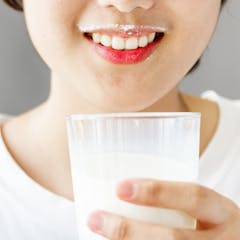
Articles sur Milk
Affichage de 1 à 20 de 79 articles

Five livestock experts who study infectious diseases in the dairy industry explain the risks.

Toddler milk is high in sugar and can leave toddlers reluctant to try new foods. It’s also heavily marketed to time-poor parents. We’re worried.

Vegan foods are considered by most consumers to have no ingredients of animal origin, but they may actually contain milk proteins.

Kenya’s smallholder farmers aren’t using antibiotics properly, some are of poor quality and some antibiotics are being found in milk.

Nigeria’s soft cheese, wara, could be made more widely available with new techniques to extend its shelf life.

If Canada wishes to preserve domestic farms and enhance food security, officials must have limits on what they can concede to American and other foreign interests.

It might seem like a simple concept, but to get ice cream right, you need three states of matter and a delicate interplay of chemistry.

A recent evidence review found children who ate full-fat dairy were healthier and leaner.

Researchers looked at the skeletal remains of 40 people, and found evidence of dairy consumption across a wide swathe of early Tibetan society.

From soup and semolina to Jamie’s school dinners: the changing face of school meals in the UK.

To understand the origins of the Yorkshire pudding Christmas dinner debate we need to turn the clock back to the time when the original pudding was first created.

For Australia’s dairy farmers the worst of times are turning out to be the best of times for farmgate prices.

Synthetic milk offers dairy milk without the concerns such as methane emissions or animal welfare. But is it the whey forward?

New Zealand is accusing Canada of undercutting its commitments under the Comprehensive and Progressive Trans Pacific Partnership on dairy. Canada’s problem is that New Zealand’s case is strong.

Look out for products fortified with important vitamins and minerals.

The industry is in the hands of smallholder farmers who struggle to raise capital and practise good farming.

People who don’t drink milk can choose other foods to get the calcium, protein, vitamins and minerals their bodies need.

UK supermarket chain Morrisons recently announced it will use ‘best before’ instead of ‘use by’ dates on its milks. This change makes sense for the environment, and from a food safety perspective too.

Technological changes on the horizon will likely disrupt the dairy industry as we know it — plans to mitigate the risks this transition poses to farmer livelihoods and animal welfare should start now.

In Canada, milk is available in jugs, cartons, bags and glass bottles. A new analysis reveals which type of container has the smallest environmental footprint — from container production to disposal.
